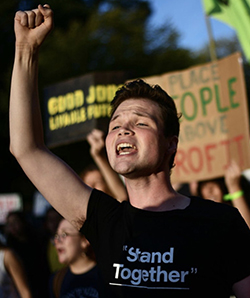
Elijah Nichols (he/him), rising junior, government and international politics
“At the end of the day, queer people have to fix our queer spaces. We see a lot of coalitions beginning to be built between Black allies and Black queer students and at-large queer organizations, which is amazing. That’s part of the way you bridge that divide and realize that no one is free until we are all free.”
Read more about Elijah Nichols

David Corwin (they/them), faculty member, associate director, Women and Gender Studies
“If you are called a correct pronoun on a regular basis, it’s very self-affirming. It also shows that the people around you care enough to refer to you as you want to be referred.”

Van Bailey (he/they), assistant dean, director, Office of Diversity, Inclusion, and Multicultural Education and LGBTQ+ Resources
“It’s very important to me to be the type of person, the type of leader I never had. I want the students to feel seen and heard and represented for their cultures and identities, not only to be celebrated but to have equitable resources and an equitable experience for their identities.”

Fe Miranda (they/them/theirs), rising junior, music education
“[Being part of musical theatre] was the first time I’d been around a lot of LGBTQ and people of color. It helped me be more confident in myself and what I wanted to do in college and as a career. ... My absolute favorite thing about Mason is the amount of places where you can build community. You can really branch out and do whatever you want.”

LuLu Géza Kelemen (they/them/theirs), assistant director, LGBTQ+ Resources
“[As an undergraduate at Mason] I explored, figured out what I wanted to do, what was important to me, and who I was I got to be involved with so many things and one of them was being a Safe Zone facilitator with LGBTQ+ Resources. ... As a student I felt like I could be anything that I wanted. That’s what I want students, LGBTQ+ or not, to feel at Mason.”
Read more about LuLu Géza Kelemen

Andrew O'Hanlon (he/they), rising junior, computer game design
“Most of the fracturing and infighting I’ve seen has taken place in online spaces. If you are building groups, building communities in person, people are much more open. If you’re putting in the work and building places in real life, then it’s usually a pretty open, good group.”
Read more about Andrew O'Hanlon
